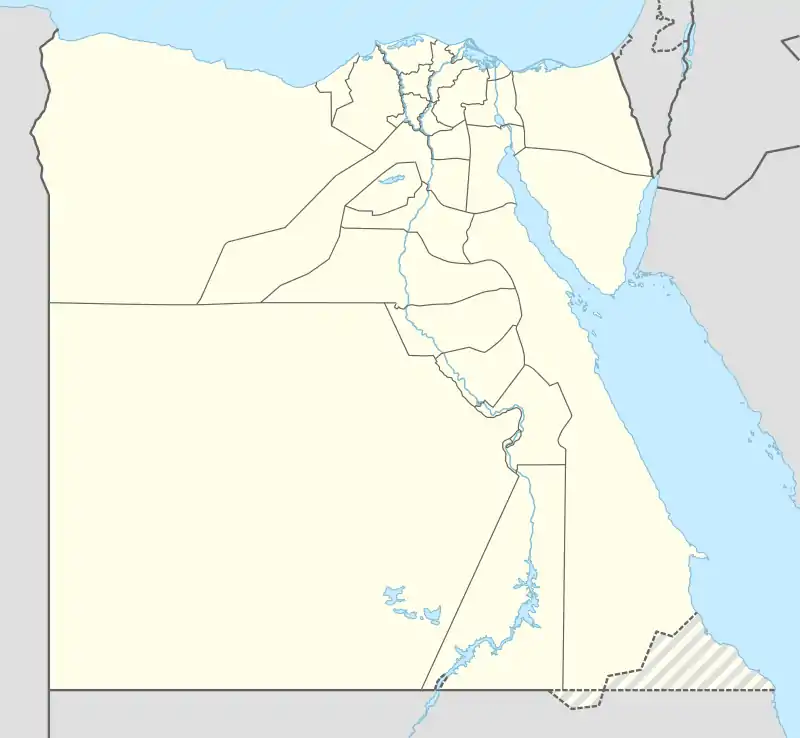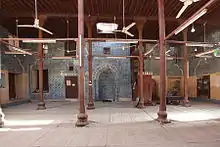Girga
ⲑⲁⲣϫⲉ جرجا | |
|---|---|
City | |
   Uthman Bey Mosque Entrance (top) - Suq Market (left) - Mitwalli Mosque Entrance (right) | |
 Girga Location in Egypt | |
| Coordinates: 26°20′N 31°54′E / 26.333°N 31.900°E | |
| Country | |
| Governorate | Sohag |
| Area | |
| • Total | 5.42 sq mi (14.05 km2) |
| Elevation | 230 ft (70 m) |
| Population (2021)[1] | |
| • Total | 162,165 |
| • Density | 30,000/sq mi (12,000/km2) |
| Time zone | UTC+2 (EST) |
Girga (Egyptian Arabic: جرجا [ˈɡeɾɡæ]), alternatively Digirga or Digurga[2] is a city in the Sohag Governorate of Upper Egypt. It is located on the west bank of the Nile River. It is the metropolitan see of the Coptic Orthodox Church.
Name
| grg[3][4] in hieroglyphs | |||
|---|---|---|---|
The name of the city comes from Ancient Egyptian: (tꜣ)-grg.t, lit. 'the settlement', which is also preserved in possibly corrupted Coptic: ⲑⲁⲣϫⲉ, romanized: tarje and its alternative name Digirga.[2]
Some Egyptologists such as Brugsch believe that the name of the city derives from the ancient Egyptian word grg miri-amoun Ramessou which means "The establishment of Ramesses II",[5] although Daressy and Budge identify the name with Coptic Balyana near Abydos.[3][4]
Through folk etymology the city became associated with St. George and a now non-existent monastery dedicated to him nearby, hence Leo Africanus calls it Giorgia and Pest suggests an older vocalisation Gurga.[2]
Overview
Girga was the capital of the Girga Governorate until 1960, when the capital was moved to Sohag and the name of the governorate changed accordingly.[6] Girga has an estimated population of 71,564 (as of 1986) and has various economic industries which include cane sugar manufacturing and pottery.
History
_-_TIMEA.jpg.webp)
The city might have been the location of ancient city of Thinis (Greek name; also spelled This) - the first capital city of unified Egypt under Narmer - as of 2023, it remains inconclusive whether Girga or nearby village of Birba is the site of Thinis (Birba was confirmed to be the site of the capital of Egypt during the 1st and 2nd dynasties).
There are ancient sites located on the territory of Girga including Beit Khallaf, a necropolis with mudbrick tombs dating back to the 3rd dynasty.
Girga was the capital of Upper Egypt during Ottoman rule.
In 1791, Saint Yousab El Abah (also Joseph el-Abbah) was the bishop of the city.
In 1907 Girga had a population of 19,893, of whom about one-third were Copts.
As lately as the middle of the 18th century the town stood about 0,4 km from the river, but in the beginning of the 20th century it stood on the bank, the intervening space having been washed away, together with a large part of the town, by the stream continually encroaching on its left bank.[7]
Places of worship
Mosques

The mosque was presumably built in about 1150 AH (= 1737) in the historical district of al-Qaysariyya by Muhammad bey al-Faqari who became a governor in 1117 AH (= 1705/1706) in Ottoman times. Although it is called Chinese, no materials imported from China were used in its construction, and it got its name after porcelain used in its decoration.
Churches and monasteries
Situated on the right bank of the Nile opposite of Girga. Since 1910 this site has been celebrated among archaeologists, because the discoveries made there have shed light on the region's prehistory.[8]
Climate
Köppen-Geiger climate classification system classifies its climate as hot desert (BWh).
| Climate data for Girga | |||||||||||||
|---|---|---|---|---|---|---|---|---|---|---|---|---|---|
| Month | Jan | Feb | Mar | Apr | May | Jun | Jul | Aug | Sep | Oct | Nov | Dec | Year |
| Mean daily maximum °C (°F) | 22.3 (72.1) |
24.3 (75.7) |
28.1 (82.6) |
33.5 (92.3) |
36.9 (98.4) |
38.3 (100.9) |
37.9 (100.2) |
38.1 (100.6) |
34.9 (94.8) |
32.4 (90.3) |
28.8 (83.8) |
23.8 (74.8) |
31.6 (88.9) |
| Daily mean °C (°F) | 13.7 (56.7) |
15.3 (59.5) |
18.7 (65.7) |
23.9 (75.0) |
27.8 (82.0) |
29.5 (85.1) |
29.5 (85.1) |
29.9 (85.8) |
27.7 (81.9) |
25.1 (77.2) |
20.4 (68.7) |
15.5 (59.9) |
23.1 (73.6) |
| Mean daily minimum °C (°F) | 5.1 (41.2) |
6.1 (43.0) |
9.4 (48.9) |
14.3 (57.7) |
18.7 (65.7) |
20.8 (69.4) |
21.2 (70.2) |
21.8 (71.2) |
20.5 (68.9) |
17.9 (64.2) |
12.2 (54.0) |
7.3 (45.1) |
14.6 (58.3) |
| Average precipitation mm (inches) | 0 (0) |
0 (0) |
0 (0) |
0 (0) |
0 (0) |
0 (0) |
0 (0) |
0 (0) |
0 (0) |
0 (0) |
0 (0) |
1 (0.0) |
1 (0) |
| Source: Climate-Data.org[9] | |||||||||||||
See also
References
- 1 2 3 "Jirjā (Kism (urban and rural parts), Egypt) - Population Statistics, Charts, Map and Location". citypopulation.de. Retrieved 16 June 2023.
- 1 2 3 Peust, Carsten. "Die Toponyme vorarabischen Ursprungs im modernen Ägypten" (PDF). p. 43.
- 1 2 Wallis Budge, E. A. (1920). An Egyptian hieroglyphic dictionary: with an index of English words, king list and geological list with indexes, list of hieroglyphic characters, coptic and semitic alphabets, etc. Vol II. John Murray. p. 1049.
- 1 2 Gauthier, Henri (1928). Dictionnaire des Noms Géographiques Contenus dans les Textes Hiéroglyphiques Dictionnaire des Noms Géographiques Contenus dans les Textes Hiéroglyphiques Dictionnaire des Noms Géographiques Contenus dans les Textes Hiéroglyphiques Vol. 5. pp. 217, 218.
- ↑ Brugsch, Heinrich (1879). Dictionnaire géographique de l'ancienne Egypte: contenant par ordre alphabétique la nomenclature comparée des noms propres géographiques qui se rencontrent sur les monuments et dans les papyrus. J. C. Hinrichs. pp. 853–854.
- ↑ Law, Gwillim (1999). Administrative Subdivisions of Countries: A Comprehensive World Reference, 1900 through 1998 (snippet view). Jefferson, NC: McFarland. p. 114. ISBN 978-0-7864-0729-3. Retrieved 2010-08-07.
- ↑ One or more of the preceding sentences incorporates text from a publication now in the public domain: Chisholm, Hugh, ed. (1911). "Girga". Encyclopædia Britannica. Vol. 12 (11th ed.). Cambridge University Press. p. 48.
- ↑ "Claremont Coptic Encyclopedia".
- ↑ "Climate: Girga - Climate graph, Temperature graph, Climate table". Climate-Data.org. Retrieved 14 August 2013.
External links
- (in German) Girga on Wikivoyage
- Usepigraphy Stele Marble Relief - Brown University